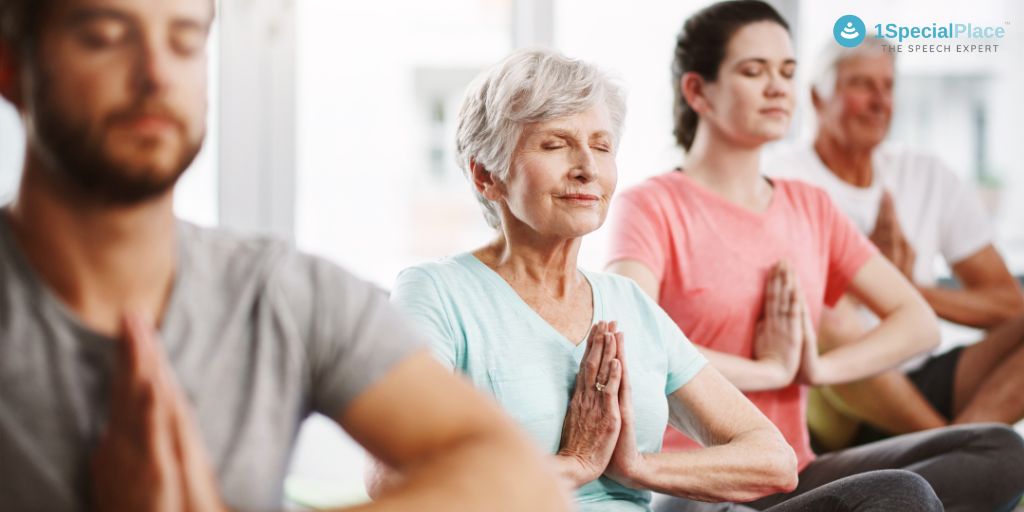
Mindfulness for adults
What is Mindfulness?
Mindfulness means being aware and being present in the present moment. It is a quality we naturally possess but thanks to our hectic schedules and lifestyle, we have forgotten to be aware. Therefore, one needs to practice mindfulness in order to truly appreciate every moment using your senses. The ultimate goal of Mindfulness for adults is to revitalize our emotional, physical and mental well-being.
How it can help?
Mindfulness helps us by being more aware of our thoughts, feelings and actions. So it helps us to stay mentally healthy and make the right choices and be completely aware of how things affect us. Studies have also shown that mindfulness improves anxiety and related mental health concerns and some neurological disorders like Parkinson’s disease and aphasia.
Furthermore, Mindfulness has shown positive effects on memory, focus and attention. It also improves the ability to manage emotions and adapt to stressful situations.
Components of Mindfulness
Mindfulness works on two main components:
- Awareness – Being aware of your thoughts, feelings and physical sensations as they happen. Here, the goal is not to stop thinking but being aware and pay attention to all thoughts and feelings that come up.
- Acceptance- Accepting thoughts, feelings and sensations without any judgment. Being non-judgmental toward yourself and not wanting to change anything is the goal.
Using all your 5 senses to
- Hear
- Feel
- Taste
- See
- Smell
Mindfulness Activities:
-
Mindfulness Meditation
Meditation is one of the most popular ways of connecting with oneself and calming down using mindfulness. Mindfulness meditation includes meditating in a comfortable position and paying attention to your thoughts and feelings as you breathe in and out. It is common for all kinds of thoughts and feelings to come to the surface. While meditating, it is important to be non-judgmental towards these thoughts and feelings and just accept them as they are.
-
Mindful cooking and eating
For those who are not comfortable with sitting in one place, it can be helpful to start mindfulness practice by inculcating it into your daily lives. Your everyday chores like cooking and eating can also be done mindfully. It is simply done by using your senses while cooking or eating.
- For example, while cooking
- Feeling the ingredients you’re using,
- Hearing the sizzling sounds of the pan or whistle of the pressure cooker
- Tasting the food in your mouth
- Seeing the colours of the food change as they cook
- Smelling the fragrance of the food being made
This simple exercise can really refresh you and help you enjoy your meal like never before. It will also help you start inculcating mindfulness practices.
-
Body scan
A body scan is a great way to ground yourself, especially when stressed out.
It requires you to close your eyes and scan your body slowly while breathing in and out deeply. Check this out for more.
-
Mindfulness Walk
While walking, try to pay attention to your sensations. Slowly start by noticing how your body feels and moves. Gradually, expand your awareness of your surroundings. Observe the trees and the views around you. Try to listen to the sounds of birds and animals. What do you see, hear, smell, or feel?
-
Journaling
Mindfulness is a way of connecting with our internal self and being more cognizant of our thoughts and our needs. Sometimes as we pay attention to these inner things, we may see a pattern so writing about what you feel and what you pay attention to can be a great way of keeping a track of yourself. It may also motivate you to continue practising mindfulness.
-
Single-tasking
We are living in a time when we glorify multitasking and staying busy all the time. Mindfulness is the opposite of multi-tasking and is often referred to as single-tasking. Single-tasking is nothing but doing one thing at a time with all your focus. A study by Levy and colleagues (2012) examined the relationship between mindfulness and multitasking. They found that mindfulness practice enhances skills that can counteract the negative consequences of multitasking.
Single-tasking can be practised anytime anywhere simply by focusing on the task at hand and finishing it instead of engaging in two or more tasks.
TAKEAWAY
We are living a life that leaves us exhausted, mentally and physically. By making these small changes, we can actively start feeling more refreshed and can focus on ourselves while carrying out other responsibilities. One small change can make all the difference. So, why not start today?
- Effects of Psychotherapy on Parental Stress - November 21, 2023
- Couple’s Therapy: Navigating marital issues as a parent - June 9, 2023
- Talk Therapy for stuttering - May 31, 2023

Leave a Comment
(0 Comments)